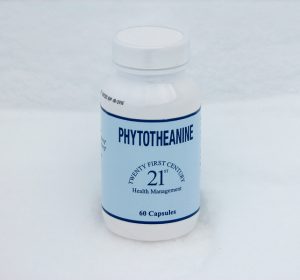Each capsule contains:
L-theanine 100 mg
Gamma-Aminobutyric Acid 210 mg
Recommended Dosage: 1-2 capsules daily
L-theanine (γ-ethylamino-L-glutamic acid) is an amino acid found only in the tea plant Camellia sinensis and related species of the genus Camellia, such as C. japonica and C. sasanqua and in the mushroom Xerocomus badius. It constitutes 1-2% of dry tea leaves.
Tea consumption is greater than for any other beverage and has been consumed for thousands of years by billions of people. Clinical studies conducted over many years have shown the efficacy and safety of L-theanine. It can be taken with or without food and at any time during the day.
L-theanine is believed to exert its anti-stress effects by:
1) Increasing alpha waves
2) Increasing GABA production, which has relaxing effects and blocks the release of serotonin and dopamine (serotonin may increase anxiety at the medial temporal lobe level)

STRESS
Stress is prevalent in North American society. In a 1998 survey it was found that 65 percent of the adult population felt they were under great stress. 9.5% of the adult population in the USA suffers from depressive illness1. It can seriously impair the immune system and lead to decreased resistance to infectious disease and autoimmune disease In addition, stress and anxiety can lead to depressive illness. In 1998, pharmaceutical sales of anti-depressants in the USA was $4.79 billion and of anti-anxiety drugs $722 million. Annual sales of anti-stress herbs were $83.2 million (for the period ending April 1999)2.
Early research studies showed that theanine had an anti-caffeine effect (measured by its reduction of the convulsive effects of caffeine in high doses)3. Further studies in Japan during the 1970’s and 80’s established its anti-stress effects.
L-theanine produces mental and physical relaxation and decreases stress and anxiety, without inducing drowsiness4,5. In one study, test subjects were divided into two groups – high anxiety and low anxiety and the subjects each given at different times 1) water, and water containing 2) 50 mg and 3) 200 mg of theanine. Brain waves were measured for 60 minutes following each test and alpha waves were observed within c. 40 minutes after theanine administration4. L-theanine increases alpha waves, which are present in an awake, relaxed state. The perceived relaxation effect is incidental with the presence of alpha waves5. Unlike other anti-stress botanicals, theanine does not make subjects drowsy or sleepy – it does not produce theta waves in the brain, which occur in a drowsy state. Based on the results of clinical studies, it has been established that L-theanine is effective in single doses in the range of 50-200 mg. It is suggested that subjects with higher levels of anxiety take a dose at the higher end of the effective range (100 – 200 mg) for best results.
PMS
Japanese studies have shown that women taking 200 mg L-theanine daily have a lower incidence of PMS symptoms. These symptoms include physical, mental, and social symptoms. Overall, a significant alleviation of PMS symptoms by L-theanine was observed.
OTHER EFFECTS OF THEANINE
In addition to reducing stress and helping with PMS, research has shown that L-theanine has the following effects:
- Increases mental acuity (by increasing GABA)
- Promotes concentration
- Improves learning
- Decreases blood pressure
- Enhances the immune system
COMPARISON OF VARIOUS ANTI-STRESS SUPPLEMENTS
| L-theanine | Kava | Valerian | St. John’s Wort | |
| Use | Anxiolytic, enhances mental acuity, anti-hypertensive | Anxiolytic | Anxiolytic, soporific | Anxiolytic, anti-depressant, sedative |
| Daily Dosage | 50 –200 mg | 100 – 200 mg | 2- 9 grams | 2 –4 grams |
| Reaction Time | 30 –40 min | 40 –60 min | 1 –3 hours | Several days |
| Duration of administration | Not limit | Not more than 3 months without medical supervision | Not limited | Not limited |
| Cautions | None | Impairs judgement and reflexes, causes yellowing of skin and nails, and enlargement of pupils | Causes drowsiness, may cause liver damage | Photosensitizer |
| Drug interactions | None known | Contra-indicated with alcohol, barbiturates and psychoactive compounds | Contra-indicated with Indivar and certain prescription drugs for heart disease, cancer, depression, seizures, and contraception |



